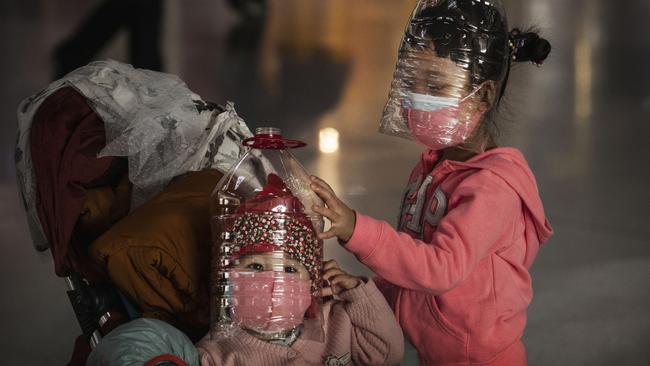Coronavirus: China isolated as global emergency declared
China is facing growing isolation as it struggles to contain the deadly coronavirus outbreak.

China is facing growing isolation as it struggles to contain the deadly coronavirus outbreak that the World Health Organisation has now declared a global health emergency.
WHO chief Tedros Adhanom Ghebreyesus said on Friday the decision was no reflection on China’s extraordinary efforts to deal with an outbreak that has killed 213 people and infected at least 9800 more, and emphasised that trade and travel restrictions were unnecessary at this stage.
The declaration — only the sixth made by the WHO — will trigger a more globally co-ordinated response to the outbreak amid fears of an uncontrollable escalation should the virus take hold in more vulnerable regions such as Africa, where the 2014 Ebola outbreak overwhelmed public health systems. “This declaration is not a vote of no confidence in China. On the contrary, the WHO continues to have confidence in China’s capacity to control the outbreak,” Dr Tedros said following a meeting of the UN agency’s emergency committee. “Our greatest concern is the potential for the virus to spread to countries with weaker health systems and which are ill-prepared to deal with it.”
But just hours later the US State Department upgraded its travel advice for China, warning its citizens not to travel there during the outbreak. The level four warning is usually reserved for countries at war or after a natural disaster.
“Travellers should be prepared for travel restrictions to be put into effect with little or no advance notice,” it wrote on its website. “Commercial carriers have reduced or suspended routes to and from China.”
China’s highest court on Friday praised eight whistleblower doctors who were arrested by Wuhan police in early January and forced to confess to spreading false rumours after they tried to alert the public to the unfolding coronavirus outbreak.
The eight were arrested on January 1 and accused of “fabricating, disseminating and spreading rumours” over online posts in late December warning of a “SARS-like” coronavirus.
The usually conservative Supreme People’s Court urged Wuhan officials to learn a “profound lesson” from their mistake, saying “rumours stop when information is public”. “It might have been a fortunate thing if the public had believed the ‘rumours’ then and started to wear masks and carry out sanitisation measures, and avoid the wild animal market,” a posting on the top court’s social media account said.
The first cases of the new coronavirus strain were detected in early December but not reported to international health authorities until January 10.
The US reported its first case of human-to-human transmission, with a Chicago woman, who caught the virus while in Wuhan, infecting her husband. Transmission cases have also been reported in Vietnam, Japan and Germany.
Britain on Friday also confirmed its first two cases of coronavirus, with two people from the same family in England testing positive.
China has implemented unprecedented measures to contain the outbreak, including a virtual lockdown of central Hubei province where the virus was first detected and which is home to more than 50 million people. Still, numbers of confirmed cases have risen more than tenfold in the past week.
In response, a growing number of the world’s airlines have suspended or cut back flights to and from China. Some countries have temporarily banned citizens of Hubei from entering, while Russia has closed its 2400km-long border with China and Hong Kong has suspended all rail services.
The US Allied Pilots Association has launched legal action to force American Airlines to “immediately halt” all 56 monthly flights to and from China, citing the “serious, and in many ways still unknown, health threats posed by the coronavirus”.
With more borders closing to it, China’s foreign ministry confirmed on Friday it was arranging charter flights to bring back Hubei province residents stranded abroad. The mass evacuation of foreign nationals from Wuhan continued on Friday, with France, South Korea, Japan and Britain airlifting citizens who will now face quarantine in their own countries. But Beijing reportedly refused Taiwan’s request to fly 300 of its citizens out of Wuhan.




To join the conversation, please log in. Don't have an account? Register
Join the conversation, you are commenting as Logout